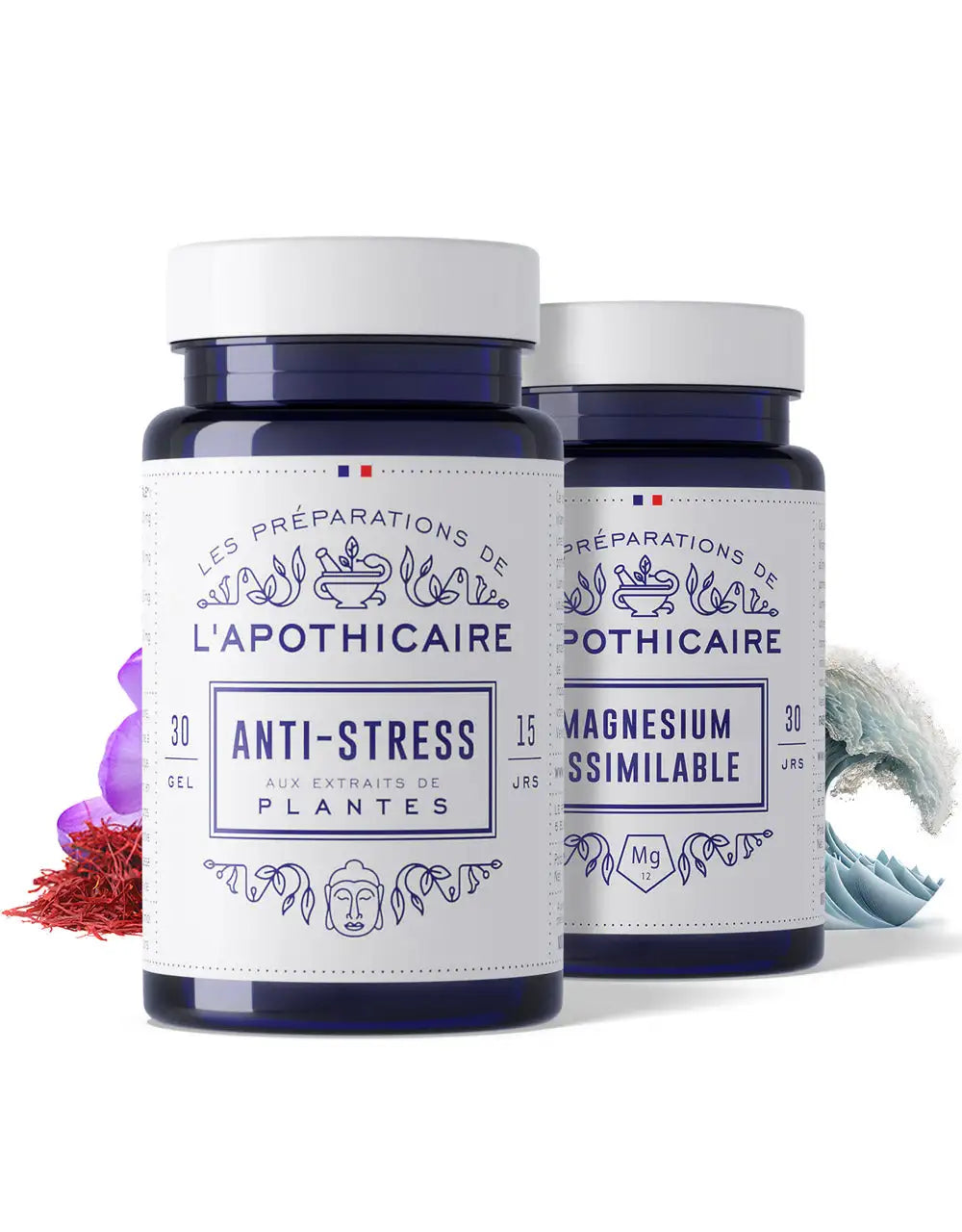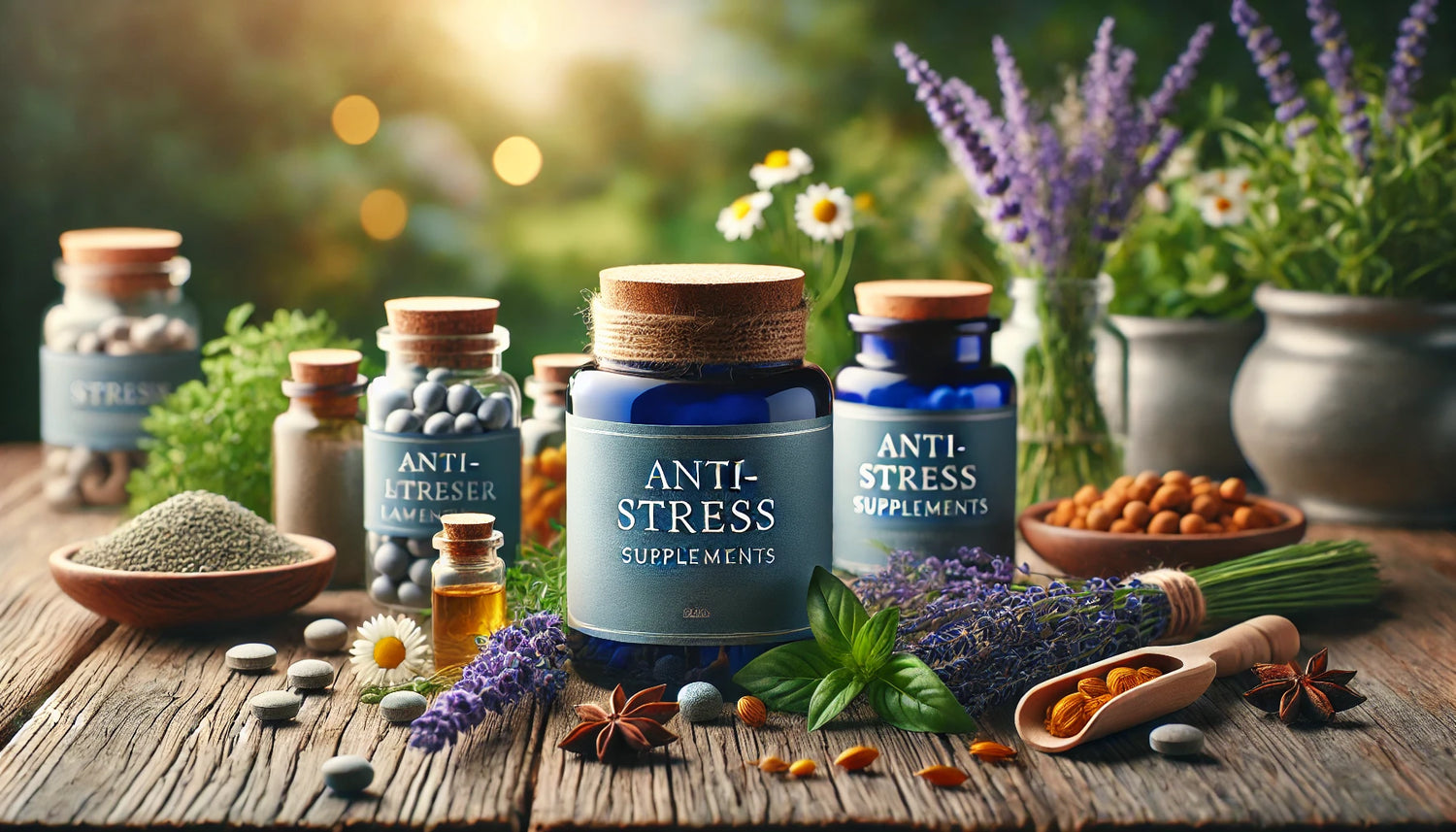Stress is a part of our daily lives, whether it is due to work, studies, or personal relationships. Although it is a normal reaction of the body to face challenges, prolonged stress can really affect our well-being. Fortunately, there are nutritional supplements that can help better manage these difficult times.
What is stress?
Stress is a natural response of the body to a situation perceived as threatening or demanding . It is a survival mechanism that allows us to react quickly to danger, but it can also be triggered in non-dangerous situations. Stress manifests itself through a series of reactions:
- physiological : increased heart rate in response to a threat
- psychological : a person may feel nervous or worried about a stressful event, such as an exam.
- behavioral : A person may become impatient or exhibit impulsive behaviors under stress.

What are the best anti-stress supplements?
Magnesium as an anti-stress supplement
Magnesium is an essential mineral that plays a fundamental role in many bodily functions, including the regulation of muscle and nerve relaxation .
During times of stress, the body tends to use more magnesium, which can lead to a deficiency. This deficiency can, in turn, worsen symptoms of stress, such as anxiety, muscle tension, cramps, and sleep disturbances.
Recommended dosage : 300 to 400 mg per day, depending on individual needs.

Apothecary Preparations helps you fight your anxiety!
Discover the combination of soothing plants in the Anti-Stress formula with Assimilable Magnesium to regulate mood, stress and irritability.
Discover anti-stress food supplements!Ashwagandha
Ashwagandha is an adaptogenic medicinal herb that has been used for centuries in Ayurvedic medicine. Adaptogens help the body adapt to different types of stress (physical, mental, emotional). This supplement is particularly effective in lowering levels of the stress hormone cortisol and improving the body's resistance to stressful situations .
Recommended dosage : 300 to 600 mg of standardized extract per day.
Rhodiola Rosea
Rhodiola Rosea is also an adaptogenic herb. It is particularly appreciated for its effects on mental and physical fatigue, especially in cases of chronic stress . By strengthening the body's ability to resist stressors, it also improves concentration and mental clarity.
Recommended dosage : 200 to 400 mg of standardized extract per day.
L-Theanine
L-theanine is an amino acid found naturally in green tea. Unlike traditional sedatives, it helps promote a feeling of calm and relaxation without inducing drowsiness . It is a particularly suitable supplement for those looking to improve their concentration while reducing anxiety.
Recommended dosage : 100 to 200 mg per day.
B vitamins as anti-stress supplements
B vitamins are essential for the proper functioning of the nervous system. They play a key role in the production of energy from food and contribute to the production of neurotransmitters , such as serotonin and dopamine, which directly influence mood. During times of stress, the need for B vitamins increases, hence the importance of an additional intake.
Recommended dosage : Follow the manufacturer's recommendations for each type of complex, generally between 50 and 100% of the recommended daily intake for each B vitamin.

How to relieve daily stress?
Relieving daily stress is essential to maintaining good physical and mental health. Here are some practical tips to effectively manage and reduce stress in your daily life.
Adopt a healthy lifestyle
Lifestyle plays an important role in stress management. It is important to pay attention to several aspects of health:
- Balanced diet : A diet rich in essential nutrients (vitamins, minerals, antioxidants) helps strengthen the nervous system and stabilize mood. For example, eating foods rich in magnesium (such as green vegetables, nuts, and whole grains) can reduce feelings of stress.
- Hydration : Drinking enough water is vital for mental health. Dehydration can worsen fatigue and anxiety.
- Limit caffeine and alcohol : Excessive consumption of caffeine and alcohol can disrupt sleep and increase anxiety.
Practice regular physical activity
Exercise is one of the most effective ways to reduce stress. When we exercise, our bodies release endorphins, often called “happy hormones,” which help improve our mood .
Recommended activities : brisk walking, jogging, yoga, swimming, cycling or any activity you enjoy.
Use relaxation techniques
Relaxation techniques are essential to calm the mind and body. Here are some effective methods:
- Deep, conscious breathing : This technique involves taking slow, deep breaths to calm the nervous system. It can be practiced anywhere, especially in times of acute stress.
- Meditation : Meditation helps reduce stress by increasing mindfulness and calming anxious thoughts. Just 5 to 10 minutes of meditation each day can make a big difference.
- Yoga : In addition to being a form of physical exercise, yoga combines gentle movements, breathing and meditation to reduce physical and mental tension.

Taking care of your sleep
Lack of sleep amplifies stress responses, while quality sleep helps build resilience to stress. One way to improve the quality of your sleep is to create a sleep routine .
To do this, try to go to bed and get up at the same time every day. Avoid screens (phone, computer) at least one hour before going to sleep.
Create moments of relaxation
It’s essential to take time for yourself, even on busy days. Here are some simple ideas:
- Spend time in nature : Nature has a calming effect on the mind. A simple walk in a park can help relieve tension.
- Reading a book or listening to music : These activities can act as positive distractions, taking thoughts away from stress.
- Take relaxing baths : Adding essential oils like lavender or chamomile to bath water can promote relaxation.
Practice gratitude and positivity
A positive mindset can alleviate the effects of stress. Practicing gratitude helps you focus on the positive aspects of life and put difficult times into perspective:
- Keep a gratitude journal : Every day, write down three things you are grateful for.
- Positive affirmations : Repeating positive phrases like “I can handle this situation” helps build confidence in the face of stress.
Consult a professional if necessary
Sometimes, stress can become overwhelming and require support. In this case, do not hesitate to consult a health professional, a psychologist or a doctor . They can help you find suitable solutions, such as cognitive and behavioral therapies (CBT) or specific treatments.
In summary, it is entirely possible to better manage daily stress by combining the right supplements such as magnesium, ashwagandha or L-theanine with simple lifestyle habits: eating well, moving and taking time to relax.
These natural solutions can really help you feel calmer and better equipped to deal with stressful times. If, despite everything, stress persists, do not hesitate to consult a professional to find suitable solutions.







